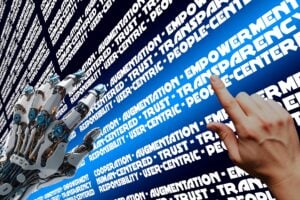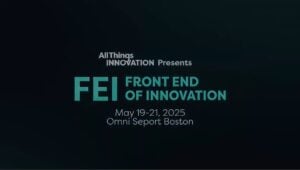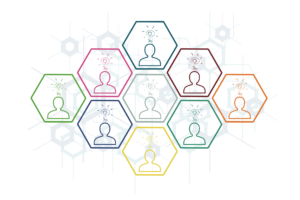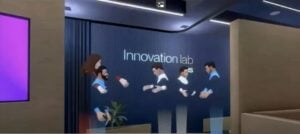An Agile Future
As the world rapidly transforms itself, both digitally, culturally, and everywhere in between, it becomes more important to develop talent. Technology is evolving, industries are changing. Nurturing the next generation of talent will be important in the future as factors like AI, and the skills needed to prompt and leverage AI tools, become more significant. Adaptation, agility and innovation are key in this disruptive environment. These skills are needed to adapt to technology but also to embrace a growth mindset and risk tolerance, to continuously learn, stay educated and engaged and adapt to changing markets and lifestyles.
Several benefits take shape when encouraging younger generations to become leaders in innovation, and as Boomers give the reins to those younger generations. According to Talent Culture’s blog on “13 Proven Ways to Develop Next-Generation Leaders,” this generational transition is leading to change. Talent Culture lists several ways that companies can adjust to this change, such as creating multifaceted development programs, offering emerging leaders programs, initiating a leadership incubator, establishing collaborative leadership circles, developing a proactive program for high-potential talent, and implementing mentoring programs that focus on specific career paths.
Emerging Innovation Talent
In “Taking Next Steps with Innovation Talent,” we look at some key steps one can take to reinforce your innovation talent initiatives. In addition, in “Putting Together Your Innovation Team,” we looked at how innovation teams are not working in a bubble. Moving forward for agile organizations there is a much greater emphasis on cross-collaboration with other teams and departments in the company. From marketing and finance, to research and insights, to technology and IT services, innovation teams are expected to integrate, co-create and align with the business and its strategies on a broader level.
Looking forward to FEI 2024? The conference, which will be held June 10 to 12, will feature a session called “Putting The Talent Puzzle Together In Next Generation Technologies,” presented by Serene Hamsho, President, The American Offshore Wind Academy. Transformative disruption takes place when new technologies are utilized within burgeoning industries by inventive change agents who understand the real-time evolution of human behavior. The application of talent can help bridge the gap with iterative change brought on by dynamic entrepreneurial change makers. Wind energy expert Hamsho discusses a talent gameplan informed by lessons learned in a burgeoning industry utilizing AI. Register for FEI 2024 here.
The Seeds of Innovation
Cultivating the next generation of talent for the innovation industry involves fostering a conducive environment for learning, creativity, and collaboration. Here are ten tips from ChatGPT to effectively nurture and develop future innovators:
- Encourage Curiosity and Exploration: Foster a culture that values curiosity and encourages employees to explore new ideas. Provide opportunities for self-directed learning, allowing team members to delve into areas of interest that align with the organization’s goals.
- Promote Cross-Functional Collaboration: Facilitate collaboration among individuals with diverse skills and backgrounds. Cross-functional teams can bring varied perspectives to problem-solving, fostering innovation through the combination of different expertise.
- Invest in Continuous Learning and Development: Support ongoing education and professional development. Provide access to training programs, workshops, and courses to help employees stay abreast of industry trends, emerging technologies, and new methodologies.
- Create a Supportive Mentorship Program: Establish mentorship programs where experienced professionals guide and support less experienced team members. This not only accelerates skill development but also imparts valuable insights and lessons from seasoned innovators.
- Emphasize Soft Skills Development: Recognize the importance of soft skills such as communication, collaboration, and critical thinking. These skills are essential for effective teamwork and problem-solving in the innovation industry.
- Instill an Entrepreneurial Mindset: Encourage an entrepreneurial mindset that values risk-taking, resilience, and a willingness to learn from failures. Provide opportunities for employees to work on passion projects and pursue innovative ideas within the organization.
- Diversity and Inclusion Initiatives: Promote diversity and inclusion within the workplace. A diverse workforce brings different perspectives, experiences, and ideas, fostering a rich and dynamic environment conducive to innovation.
- Recognition and Rewards for Innovation: Establish a system that recognizes and rewards innovative contributions. Acknowledging and celebrating achievements reinforces a culture that values and encourages creative thinking.
- Provide Access to Cutting-Edge Technologies: Ensure that employees have access to the latest tools and technologies relevant to the innovation industry. Familiarity with state-of-the-art tools can enhance efficiency and empower individuals to explore new possibilities.
- Support Entrepreneurial Ventures: Create pathways for employees to pursue entrepreneurial ventures within the organization. Offering resources, funding, and mentorship for internal startups or innovation projects can motivate and empower budding innovators.
Pursuing the Right Career Path
Organizations can build a nurturing environment that attracts, retains, and develops the next generation of talent for the innovation industry. This not only benefits the individual growth of employees but also contributes to the overall innovation capacity of the company. As ACG Resources notes in its blog, “Development of Next-Generation Talent,” “By implementing strategies that focus on education transformation, upskilling, mentorship, collaboration, and continuous learning, organizations can cultivate a workforce that is adaptable, innovative, and future-ready.”
Video courtesy of Innovation & Entrepreneurship Institute
Contributor
-

Matthew Kramer is the Digital Editor for All Things Insights & All Things Innovation. He has over 20 years of experience working in publishing and media companies, on a variety of business-to-business publications, websites and trade shows.
View all posts





































































































































































































